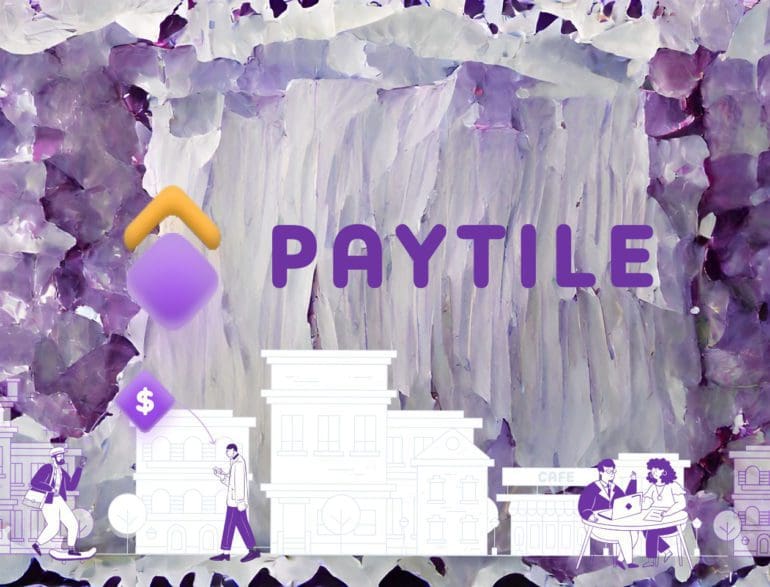Why is there no way to digitally pay people while maintaining privacy?
PayTile, an ‘AirDrop for cash,’ is a young startup that set out to solve that problem through a geolocation-based payments system that lets users send money to people nearby. This month, the firm announced a partnership with Cross River as a bank partner to supply the KYC and transmittance power to send the money.
“We started with a geolocation-based payments app,” Anu Vora, CEO and Founder of PayTile, said. “Or, you could also call it a proximity payments app. If you’re next to somebody, you should be able to send and receive money.”

Vora is a young entrepreneur, new to the fintech space, having built and sold companies in the education tech space.
Head of Product Andrew Magruder — a tech engineer expert — and Vora began building a better p2p system after bad experiences with people “misusing Venmo, or Cash App, or PayPal or Zell.”
After figuring out privacy-protecting-proximity cash send, Vora said there are countless new opportunities for the tech, from b2b, b2p, and more.
They not only let users swap digital cash: they launched MoneyDrop, to enable businesses to drop money, tickets, or more on the ‘ground’ for promotions at a physical location, and Vora said that’s just the beginning.
Properties of cash: privacy safety anonymity in digital
“I think these apps are all built to pay people that you know, but they’re not designed to work like cash, which you can use to pay people that you don’t know,” Vora said. “That was the problem we sought to solve. So, that’s what we built, and we were able to build something with geolocation and make it work as AirDrop does with the iPhone, and then we ended up building more products from there.”
To use popular p2p apps like Venmo, Vora said you have to know the person, have their email and phone number, and users have to sign in with banking details. Other users can see your general payments history, and PayPal has the same issue, Vora said, “You’re sharing information with each other.”
“And for someone like me, my full name is extremely unique; I don’t have a super safe way to interact with people,” Vora said. “Like tipping someone who parked my car at a hotel if I don’t have cash, and I feel horrible, but I also don’t want to become lifelong friends on Venmo with you because I want to pay you $5.”
For the things we have to learn before we can do them, we learn by doing them.”
— Aristotle, The Nicomachean Ethics
A young entrepreneur learning by doing
Vora, from Cincinnati, said she was early in her career and had been sticking to the mold of a Midwestern entrepreneur: keeping her head down and learning by building.
Right out of college, she founded an education tech company called AdmitAlly in 2017 and sold it by 2020. Founding a Venture studio joining boards and other startups in the health tech space, Vora said she was looking for ways to help people and knew her next startup would have to achieve that goal.
“I grew up with entrepreneurs. My entire family’s all entrepreneurs. And I knew I wanted to work on products that make people’s lives better.” Vora said.
“I’m the type of entrepreneur who learns and becomes an expert through building something. And so I became an education or higher ed technology expert because I built a higher-ed technology company, and I’m becoming more of an expert on concierge health and healthcare tech because I’m a board member for several healthcare companies in building health care companies.”
Then came PayTile
After setting out to improve the p2p space, Vora and Magruder founded PayTile in early 2020. Fortunately, the team benefited from Magruder’s extensive tech background, as he was everything from a NASA Jet Propulsion programmer, to the CTO of PlaySpan acquired by VISA in 2011.

At first, they built a mock-up that had the user snap a photo of the payee to scan their face and bring up a brief profile. They quickly realized how uncomfortable it was to be scanned to send $5, Vora said.
“And then Andrew and I were using the tool and kind of in mid-2020; He points the camera at me, and I’m like, ‘Oh, I don’t like that,'” Vora said.
As they built out the new model using geolocation data, Vora said she gained experience in the developing cycle. Even after the product was built and tested, the hardest part was the regulation and compliance piece she said. After sitting down with every bank they could find, Vora said Cross River was the clear best option.
“They don’t make this stuff easy to digest. They had questions like, ‘Once you get money transmitter licenses, when should you be a money services business?’ We were looking up, ‘What’s the cheapest bank that you could use to get a license?'” Vora said. “Every avenue has been researched and we brought so many people in from Cincinnati, which is a big fintech city, we used everyone in my backyard.”
Why Cross River?
The PayTile team considered a money transmitter license, and other compliance measures for multiple states, so they sat down with five or six different banks, Vora said. They asked what they needed to be compliant with their banking standards. Cross River was the only choice that not only had the KYC setup they needed but also was willing to work on creative solutions to other problems.
“Some of them said before users can even look at PayTile, they need to give us their nine-digit SSN. I said, ‘OK, automatic out.’ How can we do KYC in a way that does not create friction in the user experience?” Vora said.
“Cross River was the first one that really came to us with ‘Yes, and’ and every other bank we talked to was extremely ‘No, but…’ That was an early sign for me that I wanted to work with Cross River.”
One firm came to PayTile and quoted a $2 million price tag to get licensed in all 50 states. Vora said, “Alright, that ‘s not happening.” Instead, she worked with Cross river to come up with an interesting banking structure that powers the wallets on the PayTile app through the Cross River ACH system.
How does it work?
From the consumer side: users link an external wallet to add funds through their bank account into their PayTile wallet, which Cross River manages. PayTile does not own the funds in the wallet, limiting their liability. They send it and place it on the map.
PayTile also announced MoneyDrop, which is like a particular Japanese mobile monster-catching game, Vora said.
“We created something called Money Drop,” Vora said. “So [people can] walk around and put cash at or digital goods in physical places, without any hardware, anywhere in the world.”
MoneyDrop for promotions, and more
So far, the team has tested the tech by dropping 10 rewards from their office in Cincinnati to a stadium in California, Vora said, without naming the multi-billion dollar test partner. The platform enables businesses to offer money and rewards to get customers to a location. For example, a new ice cream shop that needs foot traffic.
“We’re going to use PayTile Money Drop, we’re going to money drop $5 in front of the location for up to 200 people to pick up.’ They’re going to drop $1,000,” Vora said.
“It’s going to be one pot of gold and everyone can only take from it once per device, you can’t get the five bucks without physically showing up.”
The team has cash drops ready to go, but Vora said it could be anything, like fast passes for rides at an amusement park, VIP tickets, or other promotional drops.
“Anu and the team at PayTile are revolutionizing peer-to-peer payments,” Gilles Gade, Founder, President, and CEO of Cross River said in a press release.
“By partnering with innovative companies like PayTile, Cross River creates real-time solutions to empower consumers and their finances.”


